DemDigest – January 31, 2023 – Vo Van Ai, a tireless militant in defense of religious freedom and human rights in Vietnam, died on January 26, in Paris, of complications from heart surgery. He was 88 years old, Le Monde reports.
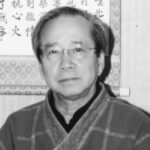
Ai was founder and president of Quê Me: Action for Democracy in Vietnam and the Vietnam Committee on Human Rights. Quê Me (meaning “homeland”), the magazine he founded in Paris, had considerable influence both in the diaspora and, clandestinely, in Vietnam itself.
“There are underground democratic movements inside Vietnam and these should be supported and aided,” he told Freedom House. “One of the ways in which we have been working over the past years is to publish information for circulation inside Vietnam to these movements, so they know what is happening in the world.”
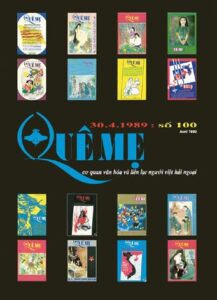
Celebrated in France for having launched the campaign “A boat for Vietnam” in the late 1970s to support the Boat People fleeing the Communist regime, Ai was the target of intimidation by the Communist municipality of Gennevilliers and an abortive arson attack on his printing press. But leading celebrities and intellectuals rallied in support, including Yves Montand, Simone Signoret, Raymond Aron, Simone de Beauvoir, Jean-Paul Sartre, André Glucksmann, and future Socialist Premier Lionel Jospin.
Born in central Vietnam in 1938, Ai moved with his family to the coastal city of Hue when he was five years old, his Wikipedia profile notes. At the age of 11, he was arrested, detained, and tortured by the French colonial authorities for participating in a Buddhist youth movement in support of Vietnamese self-determination. In 1955, he began studying medicine in Paris, but later enrolled at the Sorbonne to study literature.
After the Vietnam war ended in 1975, Ai played a leading role in publicizing the Communist regime’s human rights abuses. In 1978, he produced the first detailed map of the country’s 150 “re-education camps” (laogai), which housed over 800,000 prisoners. Later that year, he launched a campaign to charter a ship – “Ile de Lumiere” (Island of Light) – to rescue Vietnam’s Boat People, after the authorities in Indonesia and Malaysia denied permission land to 2,500 starving refugees aboard the freighter Hai Hong.
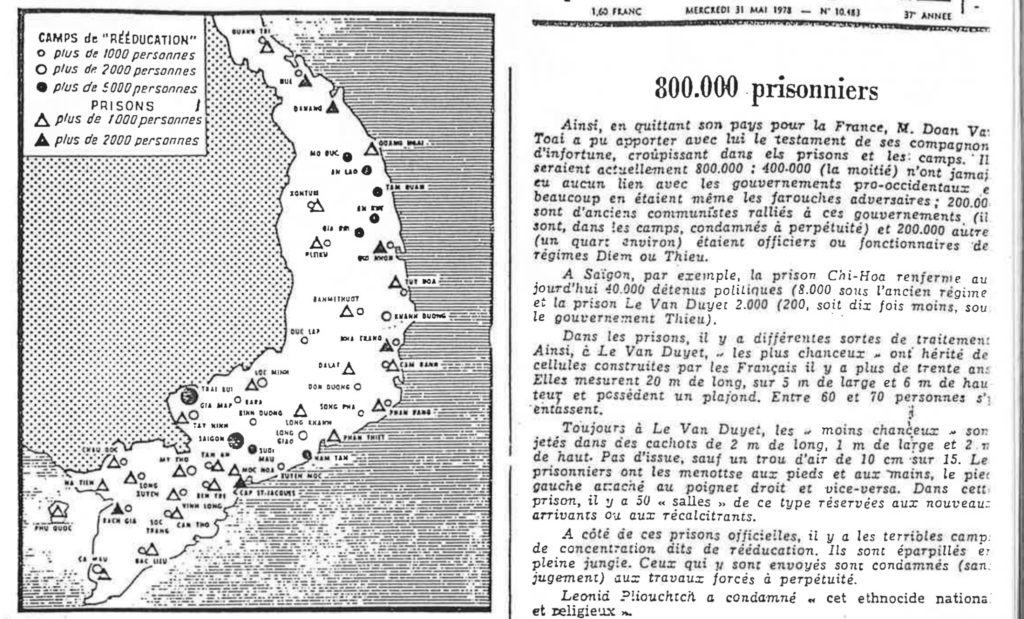
Ai was critical of Western intellectuals and activists who had actively opposed the U.S. war in Vietnam, but “remained silent as thousands of Vietnamese died in reeducation camps or drowned on the South China seas.” They “could not admit that the ‘heroic’ freedom fighters of yore had turned into tyrants, and the ‘henchmen of US imperialists’ were now the victims.”
He noted that the strongest and earliest supporters of the campaign against Vietnam’s human rights violations were the many Eastern European dissidents taking refuge in Paris. But his “Boat for Vietnam” campaign exposed the new regime’s totalitarian nature and helped shift received thinking, at least on the European left.
Communism was a “nihilistic” system, Ai insisted, drawing on negative aspects of Western thought that “produces a species of slavery” in which people are “living according to the dreams of others and following the orders of others.” Rejecting the argument that democracy and human rights were somehow incompatible with “Asian Values,” he nevertheless envisaged an alternative Vietnamese mindset, where not Asian, but Buddhist values furnished a profound resource for grounding human rights.

Ai was also Director of the International Buddhist Information Bureau, Overseas Spokesman of the independent Unified Buddhist Church of Vietnam (UBCV), currently banned in Vietnam. A staunch defender of religious freedom, he was a frequent expert witness at hearings of the United Nations, U.S. Congress, and European Parliament.
Western democracies and Vietnam were moving in completely opposite directions concerning religious freedom, he told a Washington conference on “Religious Freedom in Vietnam: Its Importance for Regional and Global Security”, featuring former U.S. Assistant Secretary of State for Human Rights Elliott Abrams and Commissioner Kristina Arriaga of the U.S. Commission on International Religious Freedom (USCIRF).
In a briefing paper last April, VCHR joined the International Federation of Human Rights in detailing the Vietnamese government’s relentless crackdown on civil society, citing an alarming escalation of arrests, unfair trials, harsh prison sentences, and physical violence against human rights defenders, bloggers, and environmental rights leaders.
While critical of the regime, Ai was tactically flexible and even saw a upside to Vietnam’s membership of the U.N. Human Rights Council.
“Although Vietnam’s joining the U.N. Human Rights Council is something negative and adverse,” he said, “we think this might have a ‘positive’ effect, in that, from now on, Vietnam’s rights violations will be effectively exposed for the international community to see how a U.N. HR Council member like Vietnam represses human rights.”
Yet he had no illusions about a regime being courted by Western governments as a hedge against a rising China.
“Vietnam plans to run for a seat on the UN Human Rights Council, but it no longer even makes an effort to put up a façade of compliance with international human rights law, as it regularly parades human rights defenders before kangaroo courts and makes a crime out of free speech”, he said.
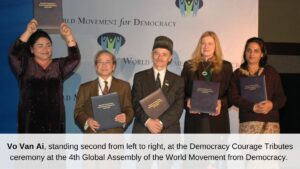
Vietnam’s policies are like a coin with two sides, head and tails, which is reflected in the language they use, Ai told the International Federation for Human Rights (FIDH), when was awarded the Special Prize for Freedom by Italy’s Società Libera. “’Heads’ is what they show the international community – I often say it is ‘for export only’ – which portrays Vietnam as an angel of democracy. ‘Tails’ reflects the grim reality on the ground.”
Quê Me was a grantee of the National Endowment for Democracy (NED) and Ai was an early contributor to the Journal of Democracy, expressing skepticism about the regime’s shift to ‘Market-Leninism’ in Third World Communism in Crisis: Reform Runs Aground in Vietnam.
“He dedicated his life to fighting for freedom in Vietnam and inspired today’s young generation of civil society,” the World Movement for Democracy tweeted. Ai received the Democracy Courage Award Recipient at its 4th Global Assembly.
The author of numerous articles and human rights reports, Ai’s publications also include 17 books of poetry, essays and philosophy, as well as studies on Buddhism and Vietnamese history. He leaves behind his wife and long-time partner, Penelope Faulkner.
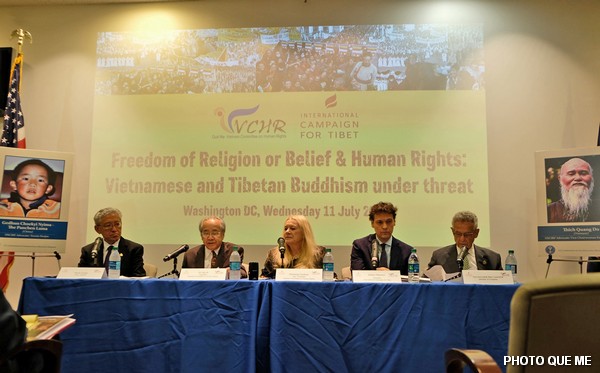
@NEDemocracy grantee & @JoDemocracy contributor #VoVanAi‘s campaign to aid #Vietnam‘s #BoatPeople won support from #YvesMontand #SimoneSignoret #RaymondAron, #SimonedeBeauvoir #JeanPaulSartre #AndréGlucksmann & future Socialist Premier #LionelJospin. https://t.co/yBgEy9YZPn
— Democracy Digest (@demdigest) February 1, 2023
 Quê Me Quê Me: Action for democracy in Vietnam & Vietnam Committee on Human Rights
Quê Me Quê Me: Action for democracy in Vietnam & Vietnam Committee on Human Rights





